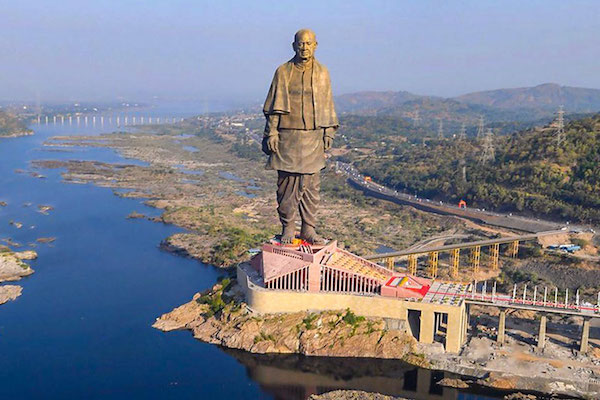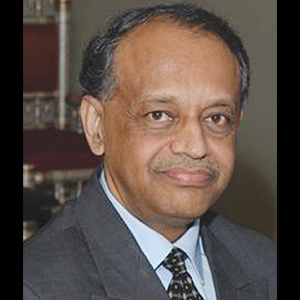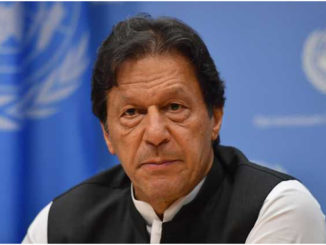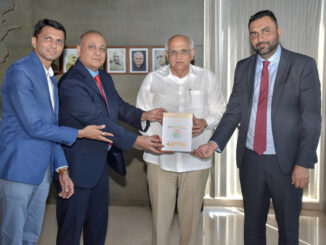

“It is quite confusing for an ordinary Indian to figure out the motivation for the Prime Minister to honor a devoted Congressman and freedom fighter who is a Gujarati ahead of another great leader from the state: Mohandas Karamchand Gandhi. Nevertheless, to the world, Gandhi, Nehru, and Patel will remain great icons of freedom and justice, and the height of the statues will not diminish their greatness one way or the other.”
Prime Minister Narendra Modi inaugurated the world’s tallest statue of Sardar Vallabhbhai Patel, the Iron Man of India, who was the first home minister, on his 143rd birth anniversary in Gujarat recently. The country has spent about Rs 3000 crore (about $430 million) from the treasury on the monument, which is being promoted as a Statue of Unity. It reflects Patel’s efforts after Independence to consolidate the princely states into the current Republic of India.
We owe it ourselves to remember our heroes and icons of history and it is also the legacy of these legends that motivates us to go forward. Our lives are indeed built upon the shoulders of these giants who went through immeasurable hardships to guarantee us the freedom and liberty we enjoy today.
Nobody questions the wisdom of honoring Sardar Patel. However, they will be hard-pressed to explain how in a country that ranks at the bottom of the list of nations in ensuring food security for its people could afford such a luxury. According to the latest report on the Global Hunger Index, India ranks 100 out of 119 on an index that weighs the ability of countries to provide food for its citizens. India fares worse than Iraq, Bangladesh, and North Korea.
Then again, if we were to build the tallest statue for anyone, the first name on anybody’s list would be of Mahatma Gandhi, who is not only the father of the nation but also world-renowned for his philosophy of non-violence. Gandhi was considered a great inspiration for world leaders such as Nelson Mandela and Martin Luther King Jr and many cities in the world are adorned with his statues.
Then there was Jawaharlal Nehru, the first prime minister, and architect of modern India who spent almost ten years in prison under the British and was considered the foremost leader in the freedom struggle. It should be remembered that Patel’s heroic effort for national integration was conducted under Nehru’s leadership. Nehru inherited an India where life expectancy was 31 years, only 20 percent of the people could read or write, and 80 per cent of the people could not afford two meals a day.
It was Nehru along with B.R. Ambedkar who built institutions that have continued to provide freedom, justice, and opportunities to every Indian citizen regardless of caste, creed, region or religion. However, today, the ruling BJP is engaged in running a bitter campaign to undo and discredit his legacy of secularism and inclusiveness. It would be a grave injustice to forget Nehru’s significant role in building a post-independent democratic society and imbuing it with pride and purpose at a time of conflict and chaos.
Sardar Patel was a loyal Congressman who upheld the values and principles of the Congress party which he served throughout his . Since the ascendance of the BJP to power in New Delhi four years ago, it appears that a carefully crafted strategy is in place to appropriate icons and legacies that the party is sorely lacking. It is as if the party is so embarrassed by the lack of pedigree that it is even willing to go out and create some history of its own.
After Mahatma Gandhi was assassinated, it was Sardar Patel who was instrumental in banning the RSS. He subsequently wrote to RSS chief M.S. Golwalkar on September 11, 1948: ‘As regards to RSS and Hindu Mahasabha, our reports do confirm that as a result of the activities of these two bodies, particularly the former, an atmosphere was created in the country in which such ghastly tragedy became possible.’
It is known that the RSS remained aloof during the freedom struggle. The words and deeds of erstwhile leaders of the RSS from recorded history indicate that they were not only non-participants in the freedom struggle in which hundreds of people were risking their lives every day but also collaborators who supported the British on critical occasions. The British acknowledged that the RSS had ‘scrupulously kept itself within the law, and refrained from taking part in the disturbances that broke out in August 1942.’
Therefore, it is quite confusing for an ordinary Indian to figure out the motivation for the Prime Minister to honor a devoted Congressman and freedom fighter who is a Gujarati ahead of another great leader from the state: Mohandas Karamchand Gandhi. Nevertheless, to the world, Gandhi, Nehru, and Patel will remain great icons of freedom and justice, and the height of the statues will not diminish their greatness one way or the other.
(The author is a former Chief Technology Officer of the United Nations and Vice-Chairman of the Indian Overseas Congress, USA)





Be the first to comment